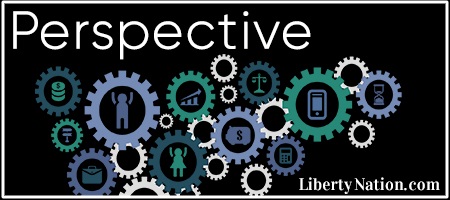
HONG KONG, CHINA – 2021/08/10: Shoppers are seen at an electronic store displaying mobile phone brands carrying 5G network technology in Hong Kong. (Photo by Budrul Chukrut/SOPA Images/LightRocket via Getty Images)
A great global internet, with access for all, is coming – but at what cost? National Security Advisor of the United States Jake Sullivan was joined by numerous other world leaders Thursday morning in announcing a new Declaration for the Future of the Internet. The globalist vision of a decentralized network of networks would intrigue any lover of liberty, but then there’s the bit about governments partnering with academics, civil society, the private sector, and the technical community to govern it. Americans have seen already what happens when the government holds hands with the private sector. Given the actions of the Biden administration so far, one wonders if this new online utopia will have room for the freedom of expression that made the internet great to begin with.
The Declaration was lauded as an affirmative vision, and a few themes came up across all the many speeches. The internet should be safe, secure, inclusive, and affordable for everybody on earth. It should protect human rights. And it’s up to the governments of the world to work with other influential bodies to shepherd the web into this golden age of equity.
The Illusion of Inclusivity
“This declaration represents a political commitment among Declaration partners to advance a positive vison for the Internet and digital technologies,” reads the fact sheet from the White House. “It reclaims the promise of the Internet in the face of the global opportunities and challenges presented by the 21st century.”
For a global agreement focused on guaranteeing access to all, protection of human rights online, and security against cyberattacks and misinformation, two nations are conspicuously absent: misinformation-spreading Russia and wannabe online dictatorship China. It’s unclear how the Declaration partners plan to protect the global internet from these two bad actors – or any others, for that matter. As for worldwide connection, how does the rest of the planet intend to provide affordable and reliable access to the people of Russia, China, Iran, Syria, Vietnam, North Korea, etc.?
The False Freedom

It isn’t all rainbows and sunshine in the so-called free world, either. We’ve seen right here in the United States what a partnership between the federal government and the private sector looks like. Last summer, the Biden administration announced that it was actively encouraging social media censorship, even going so far as to flag “problematic posts” to alert Facebook to “medical misinformation” regarding the pandemic. Sure, the White House wasn’t “forcing” Facebook to remove posts it didn’t agree with – but even if a platform removing posts because the president’s people “suggested” it doesn’t violate the letter of the law, one can certainly consider the spirit of the First Amendment banished from the material plane.
More recently, the Department of Homeland Security has apparently established a “Misinformation and Disinformation Governance Board,” ostensibly to curb the targeting of minorities with misinformation. As Liberty Nation’s Mark Angelides pointed out, the head of this operation, Nina Jankowicz, “has shown herself willing to be swayed by partisan ideology when determining what constitutes a fact and what is ‘disinformation.’” Mark gives several examples of her parroting the party line over the last several years, even when the narratives continually come out as untrue. So what does the US government, under Biden’s benevolent rule, consider misinformation? The aforementioned COVID items, the Hunter Biden laptop scandal, or the idea that parents should have some input or even knowledge of what their children learn in school.
Liberty or Liability?

(Photo by Budrul Chukrut/SOPA Images/LightRocket via Getty Images)
Under the heading “Protection of Human Rights and Fundamental Freedoms,” the Declaration seeks to promote “online safety and strengthen our work to combat violence online, including sexual and gender-based violence,” and “promote safe and equitable use of the Internet for everyone, without discrimination based on sex, race, color, ethnic, national or social origin, genetic features, language, religion or belief, political or any other opinion, membership of an indigenous population, property, birth, disability, age, gender identity or sexual orientation.” It seems quite clear, however, both from the language of the Declaration and the behavior of the US government as well as those of several other partners, that not all political views and beliefs are created equal.
During the panel discussion, one representative said that the current level of online gender-based violence – specifically harassment directed along gender lines – can’t be tolerated anymore. This conduct should be viewed as criminal, she explained, adding that it ought to be a law enforcement issue. According to Global Citizen, online gender-based violence includes cyberbullying, doxing, cyberstalking, non-consensual pornography, and – here’s the kicker – trolling, which is further defined as “deliberately upsetting other people by posting inflammatory content.”
The speaker then went on to talk about standing up for the women and “all the genders” that were affected – which sure sounds a lot like the progressive idea that refusing to acknowledge new genders or even accidentally misgendering someone are, in fact, acts of violence and hate crimes.
Will this coalition of world powers meddling with the internet really result in liberty and justice for all, or will it censor – perhaps even criminalize – any ideas not approved by the powers that be?
Remember to check out the web’s best conservative news aggregator
Whatfinger.com — the #1 Alternative to the Drudge

